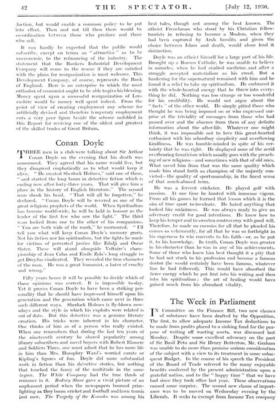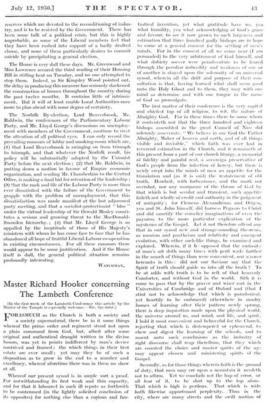The Week in Parliament
Tx Committee on the Finance Bill, two new clauses of substance have been drafted by the Opposition. The first, to allow adequate Income Tax deductions to be made from profits placed to a sinking fund for the pur- pose of writing off wasting assets, was discussed last Monday. Despite some excellent advocacy on the part of Sir Basil Peto and Sir Henry Betterton, Mr. Graham was unable to do more than promise serious consideration of the subject with a view to its treatment in some subse- quent Budget. In the course of his speech the President of the Board of Trade referred to the many enjoyable benefits conferred by the present administration upon a grateful nation, and to the " happy time " that we have had since they took, office last year. These observations caused some surprise. The second new clause of import- ance was to be moved on Wednesday evening by the Liberals. It Seeks to exempt from Income Tax company
reserves which arc devoted to the reconditioning of indus- try, and is to be resisted by the Government. There has been some talk of a political crisis, but this is highly improbable, as some of the Liberal members feel that they have been rushed into support of a badly drafted clause, and none of them particularly desires to commit suicide by precipitating a general election.
The House is very dull these days. Mr. Greenwood and Miss Lawrence secured the third reading of their Housing Bill in stifling heat on Tuesday, and no one attempted to stop them. Indeed, as Sir Kingsley Wood pointed out, the delay in producing this measure has seriously slackened the construction of houses throughout the country during the past twelve months. It contains little of intrinsic merit. But it will at least enable Local Authorities once more to plan ahead with some degree of certainty.
The Norfolk By-election, Lord Bcaverbrook, Mr. Baldwin, the conferences of the Parliamentary Labour Party, and Mr. Lloyd George's discussions on unemploy- ment with members of the Government, continue to rivet the attention of all political eyes. I can only record the prevailing rumours of lobby and smoking-room which are, (1) that Lord Beaverbrook is swinging on from trimnph to triumph, and that whatever the Norfolk result, his policy will be substantially adopted by the Unionist Party before the next election ; (2) that Mr. Baldwin, in putting down a motion in favour of Empire economic organization, and sending Mr. Chamberlain to the Central Office, is making a final bid for retention of the leadership ; (3) that the rank and file of the Labour Party is more than ever dissatisfied with the failure of the Government to grapple with the problem of unemployment, that this dissatisfaction was made manifest at the last adjourned party meeting, and that a socialist-protectionist " bloc" under the virtual leadership of Sir Oswald Mosley consti- tutes a serious and growing threat to the MacDonald- Snowden hierarchy. ; (4) that Mr. Lloyd George is so appalled by the ineptitude of those of His Majesty's ministers with whom he has come face to face that he has abandoned all hope of fruitful Liberal-Labour co-operation in existing circumstances. For all these rumours there would appear to be some justilication. And if the House itself is dull, the general political situation remains profoundly interesting.
WATCHMAN.





































 Previous page
Previous page